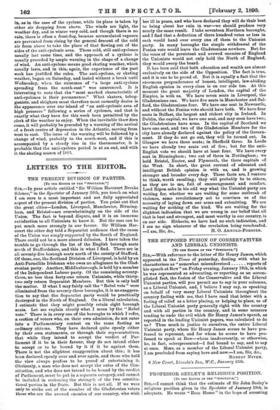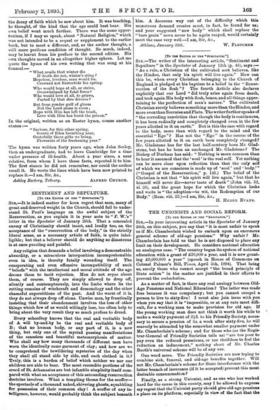PROFESSOR SEELEY'S RELIGIOUS POSITION. [To THE EDITOR OF THE "
SPECTATOR."] SIR,—I cannot think that the estimate of Sir John Seeley's religious position given in the Spectator of January 19th, is adequate. He wrote " Ecce Homo" in the hope of arresting
the decay of faith which he saw about him. It was teaching, he thought, of the kind that the age could beat bear. His own belief went much further. There was the same oppor- tunism, if I may so speak, about "Natural Religion," which was not intended to be a sequel or supplement to the earlier book, but to meet a different, and, as the author thought, a still more perilous condition of thought. So much, indeed, may be learnt from his preface to the second edition. His own thoughts moved in an altogether higher sphere. Let me quote the hymn of his own writing that was sung at his funeral
" What avails that winter die
If death die not, winter's sting ? Hopeless, loveless, man would lie, Crowned not Eastertide his spring.
Who would hope at all, or strive, Overwhelmed by fatal force ? Who would love at all, to grieve, Parted ty that dire divorce ?
But from yonder gulf of gloom Not the Lord alone is risen ; Hope with Him has left the tomb, Love with Him has burst the prison."
in the original, written as an Easter hymn, comes another stanza :—
" Saviour, for this other spring,
Scents of Eden breathing near, Gratefully these gifts we bring, Flowerets of the freshening year."
'The hymn was written forty years ago, when John Seeley,
then an undergraduate, had to leave Cambridge for a time under pressure of ill-health. About a year since, a near relative, from whom I have these facts, repeated it to him. `The first stanza he did not remember, nor could the author recall it. He wrote the lines which have been now printed to replace it.—I am, Sir, &c.,



































 Previous page
Previous page